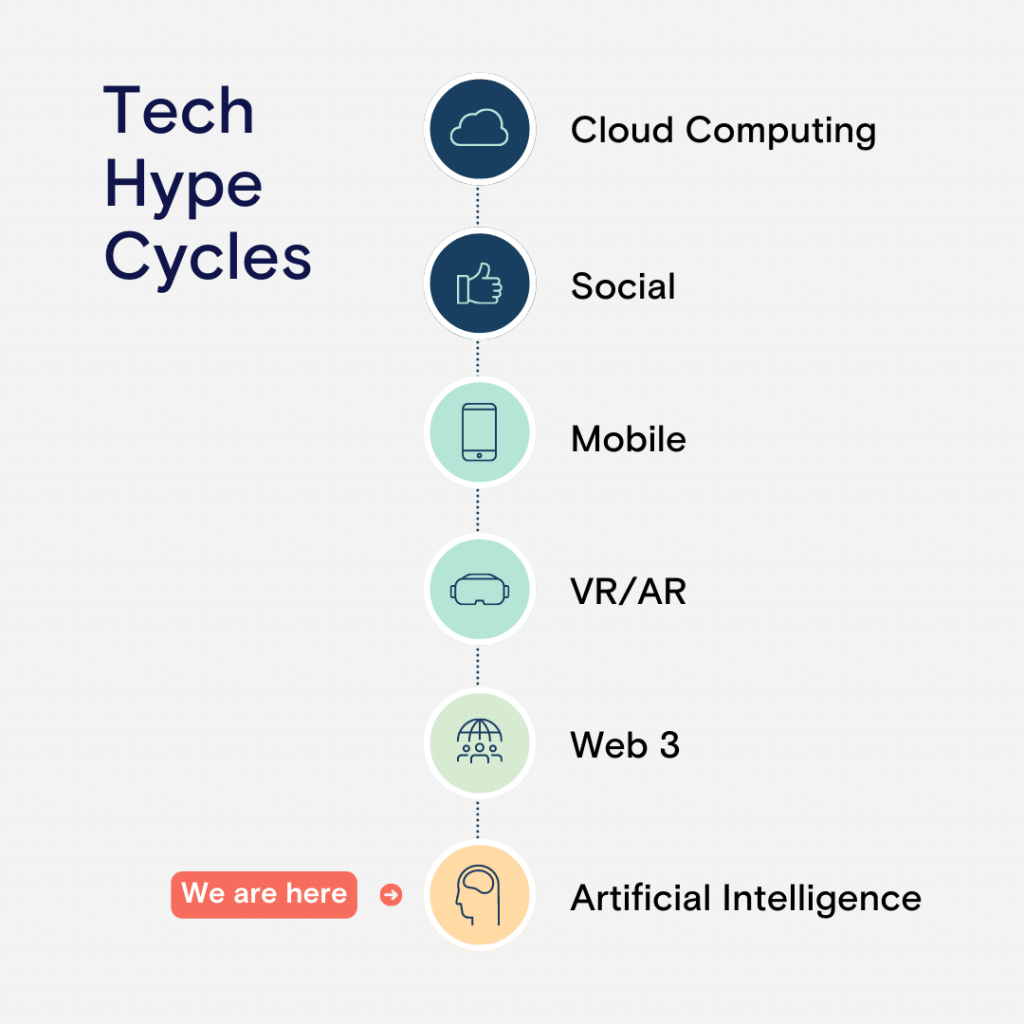A.I. Will Be The Most Useful Tech Trend of 2023

It already seems that the tech trend that’s going to have the greatest impact on the way we all work this year is Artificial Intelligence.
Every year there is one tech-fuelled hype cycle or another, and in each case, the run-up is hyperbolic, and the adoption is slower than anticipated. What varies, however, is the lasting impact that the trend has on “real life.” Here are the last 5 “next big thing in tech” trends:
- Web 3
- VR/AR
- Mobile
- Social
- Cloud Computing
Notice that the farther back we go, the greater the impact and the more obvious the technology. For example: imagine a world without cloud-based storage like Google Drive or applications like Quickbooks or Salesforce?
Today it seems obvious that mobile is the primary way people access information and communicate with each other, but in the days of BlackBerry, it was common for people to laugh at the ridiculous idea that mobile could ever replace the desktop computer.
The jury may still be out on the real impact that VR headsets and Web3 will have, but maybe that’s because they haven’t yet had time to find their use cases and start becoming legitimately useful.
This year we’re on the very front of the next hype-cycle, and this one has been coming for a while. Like most overnight sensations, AI is not actually new, it has just now caught mainstream attention because of recent user-friendly interfaces released by companies like OpenAI – you’ve likely heard of their ChatGPT chatbot and DALL-E, the image generator.

What seems to be driving this boom of attention is more than hype. The last few trends were fuelled largely by VC speculation and science fiction fantasies. Today, there are real ways that we can use these AI tools, which is why we’re predicting that, like everything else, this trend will certainly come with it’s own hyperbole, but it will also provide real opportunities and advantages for those who embrace it. Here are a few that we’re already seeing:
- There’s a Chrome extension that will use ChatGPT to write all of your Tweets for you: TweetGPT (caution: always review your Tweets before sending)
- Another extension will display ChatGPT results next to your search engine results so you can compare and select the one that’s most helpful: WebChatGPT
- Don’t want to watch a 60-minute video? You can have it create a transcript of any YouTube video, and then have ChatGPT summarize it into any length that you like: youtubetranscript.com
- The prompts themselves are becoming valuable, so this application will save your best ones and allow you to build on them later: ChatGPT Prompt Genius
Everyone is using ChatGPT.
But 99% of people don’t understand how you can use it in your daily life.
Here are 9 things you can do right now to improve your life with AI:
— Antonio Reza (@theantonioreza) January 14, 2023
Those are just a few of the simple, useful applications, but some larger organizations are a few steps ahead of us and have been using AI in their work for years:
- Popular tech review site CNET has been using AI to generate explainer articles for years
- The spirits brand Martini used AI to develop the creative for its latest campaign
- Nestle has hired AI to be its newest Art Director
There is at least one more field that applies to all of our organizations, typically requires a lot of mind-numbing work, and will almost certainly benefit greatly by AI bots, and that’s SEO. If you have an SEO project on your plate, I highly recommend this list of ways that AI can help out, from Search Engine Journal.
So, are we in an over-hyped media frenzy that exaggerates and misunderstands the impacts of AI? Yes.
Will AI be the most influential and genuinely useful tech trends 2023? Also yes.


